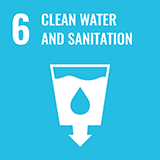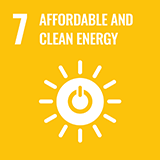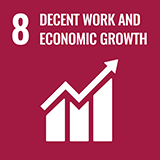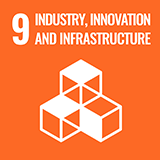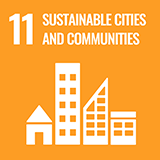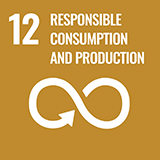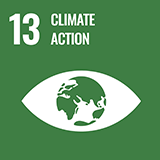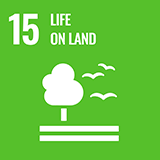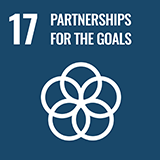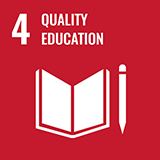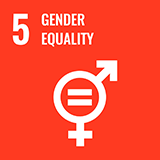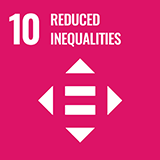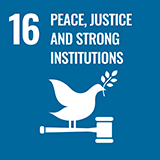Materiality / KPIs and Targets
Materiality
Under our long-term vision, "Becoming a Next-generation Developer," the Tokyo Tatemono Group aims to achieve a high-level balance between providing solutions to social issues and pursuing growth as a company.
In 2019, the Tokyo Tatemono Group determined a number of material issues for the social issues identified in consideration of international issues (the SDGs) and domestic or industry-specific issues, evaluating their importance in terms of the magnitude of social needs and their affinity with our business.
Since then, we have begun to revise these material issues in response to major changes in the social landscape and people's values, such as with the outbreak of the corona-virus pandemic. Based on our corporate philosophy and long-term vision, we considered the social issues identified in the SDGs and international guidelines on sustainability, and utilized the knowledge gained through advice from external experts, participation in various initiatives, and communication with stakeholders. Using this information, we held discussions with internal directors and exchanged opinions with external directors regarding themes related to materiality, and in June 2021, we identified 14 current material issues. The Board of Directors has also confirmed the appropriateness of these material issues.
On our path to realizing our long-term vision, the Tokyo Tatemono Group's materiality has been identified from the perspective of both social value creation and a value creation platform with an awareness of our shared values with society we realize through our business. The Tokyo Tatemono Group will seek to develop solutions to these material issues through its business to maximize our positive impact (opportunities) on society while minimizing our negative impact (risks). In this way, we will help bring about a sustainable society while growing as a company.
|
Material issues |
Shared values with society |
Contribution to SDGs |
|
|---|---|---|---|
|
Social value creation |
 Strengthening Tokyo's competitiveness as an international city |
Creating value of place and value of experience |
|
 Contributing to a safe and secure society |
|||
 Community building and revitalization |
|||
 Wellbeing |
|||
 Addressing the diverse needs of customers and society |
|||
 Value co-creation and innovation |
|||
 Social implementation of technology |
|||
 Revitalizing and Utilizing Real Estate Stock |
|||
 Promoting a decarbonized society |
Coexistence with the earth and the environment |
||
 Promoting a recycling-oriented society |
|||
|
Value creation platform |
 Improve employee growth and job satisfaction |
Value-creating talent |
|
 Diversity & Inclusion |
|||
 Advancement of governance |
Realizing sustainability management |
||
 Strengthen risk management framework |
|||
Materiality Identification Process
2018
-
To obtain a broad grasp of the social issues relevant to our business, the Group listed 35 social issues to study. Our list took into consideration international issues (the SDGs), issues unique to Japan and issues unique to our industry (Basic Policies for Urban Renaissance, Act on National Strategic Special Zones).
2019
-
We evaluated the importance of 35 social issues. In making this evaluation, we incorporated two perspectives: the scale of the social need (whether the issue requires a solution) and the affinity of the issue with our business (whether the issue is closely concerned with our current business or something we may wish to deal with as a business in the future). To further clarify the relative importance of issues, we assigned points based on four aspects.
-
Based on the above evaluation, we mapped the issues to narrow them down to those of relatively high importance. We organized these issues into three categories based on their content and identified them as the Group's material issues.
|
Evaluation perspectives |
Assigning point values to indicators |
|---|---|
|
Scale of social need |
1 Relationship with the Real Estate Industry |
|
Affinity with our business |
2 Relationship with Our Businesses |
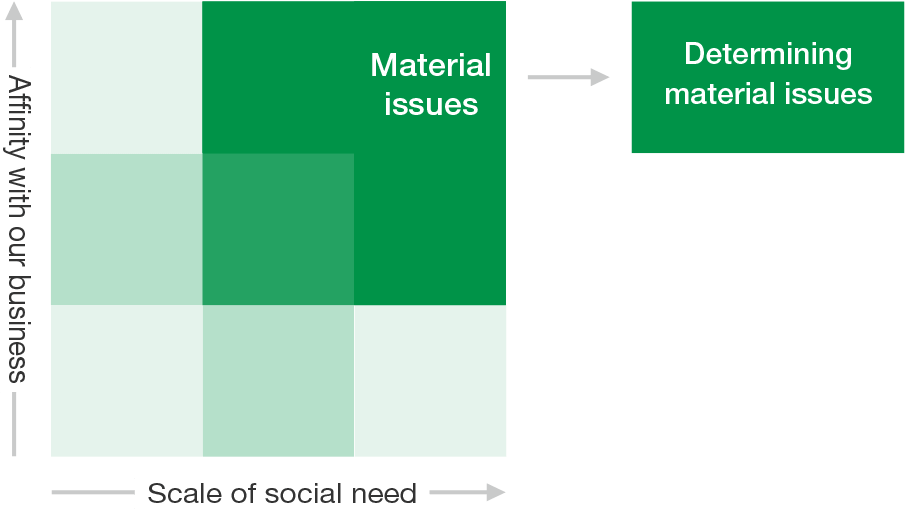
2020
-
In response to recent changes in social conditions and values, we initiated the process of reviewing our materiality. We organized the material issues based on their relationships to key themes in the advancement of ESG management.
-
We engaged in discussions with internal and external directors on themes related to materiality, consolidating their expectations of the Group as well as their views on areas for improvement.
2021
-
Based on our corporate philosophy and long-term vision, we considered the social issues identified in the SDGs and international guidelines on sustainability. We incorporated the knowledge that we have gained through advice from external experts, participation in various initiatives, and communication with stakeholders.
-
We also view the advancement of ESG management as a key component of materiality. We have categorized this in terms of the perspective of value creation for society and the perspective of realizing that value creation for society.
-
The Sustainability Committee judged the materiality to be appropriate, finding that it encompassed the social issues expected of the Group.
-
The Board of Directors also deemed them to be appropriate.
Going forward, we will consider revising our materiality
as necessary depending on changes in social conditions or updates to management policies.
Information Resources Related to Social Issues
-
SDGs:
-
International goals for the years 2016-2030 as listed in the 2030 Agenda for Sustainable Development (adopted at the United Nations Summit in September 2015)
-
Action Plan of the Growth Strategy:
-
A summary of the government's priority policies, including its actions toward a new social vision in the context of COVID-19
-
Green Growth Strategy:
-
A summary of government policies to achieve carbon neutrality in 2050
-
Basic Policies for Urban Renaissance:
-
A summary of the Japanese government's basic policy for revitalizing cities
-
Law on National Strategic Special Zones:
-
A summary of the Japanese government's zoning policy for national strategic special zones
Material Issue KPIs and Targets
The Tokyo Tatemono Group has set KPIs and targets based on the material issues identified in June 2021. In the area of climate change in particular, in response to increasing social demands for companies to address climate change, we set a target in June 2021 of net zero CO2 emissions by fiscal 2050. And in October 2023, we accelerated our efforts by raising the target to reduce Scope 1 and 2 emissions by 46.2% by fiscal 2030 compared to 2019 levels, which is the level required to limit the increase in global average temperature to 1.5。・ compared to pre-industrial levels. We have also set and are promoting goals related to the development of zero energy buildings and homes, shift to renewable energy, and acquisition of green building certifications as process goals to achieve medium- and long-term targets to reduce greenhouse gas emissions.
In order to achieve these medium- and long-term targets, we have incorporated an action plan with these process goals in mind into the business plans of each business division or unit. Progress is then monitored and tracked by the Sustainability Promotion Committee and Sustainability Committee using the PDCA cycle.
The Board of Directors also monitors and supervises progress toward the targets.
Material Issue KPIs and Targets
Environmental
| Items | Scope of Coverage | KPIs and Targets | Track Records | Details Sustainability Report 2024 |
|||
|---|---|---|---|---|---|---|---|
| FY2021 | FY2022 | FY2023 | |||||
|
Promoting a decarbonized society |
|||||||
| Reduction in greenhouse gas emissions | All businesses*1 | 【Scope1・2・3】 Net zero CO2 emissions by FY2050 |
CO2 emissions [Unit: t-CO2] |
1,034,699 | 1,015,172 | 984,407 | P.27 |
| 【Scope1 and 2】 46.2% reduction in CO2 emissions compared to FY2019 levels by FY2030*3 |
71,412 | 72,213 | 44,283 | ||||
| 【Scope3*2】 40% reduction in CO2 emissions compared to FY2019 levels by FY2030*3 |
762,130 | 596,335 | 621,989 | ||||
| Development of zero energy buildings and homes*4 | Commercial Properties Business | Develop ZEB for, in principle, all new office buildings and logistics properties*5 | Percentage of ZEB developments [Unit:%] |
- (Not applicable) |
- (Not applicable) |
- (Not applicable) |
P.28 |
| Residential Business | Develop ZEH for, in principle, all new for-sale condominiums and for-rent condominiums*6 | Percentage of ZEH developments [Unit:%] |
- (Not applicable) |
- (Not applicable) |
100.0 (Applies to 1 property) |
||
| Shift to renewable energy | All businesses*1 | Procure 100% of electricity consumed in business activities from renewable energy sources by FY2050 | Percentage of electricity from renewable energy sources [Unit: %] |
1.8 | 11.2 | 31.1 | P.27 |
| Commercial Properties Business | Procure 100% of electricity consumed at owned properties from renewable energy sources by FY2030 | 6.9 | 35.2 | 41.9 | |||
| Procure at least 50% of electricity consumed at owned properties from renewable energy sources by FY2024 | |||||||
| Acquisition of green building certifications*7 |
Commercial Properties Business, Residential Business |
Acquire green building certification for, in principle, all new office buildings, logistics properties, and for-rent condominiums*8 | Percentage of green building certifications acquired [Unit:%] |
- (Not applicable) |
- (Not applicable) |
- (Not applicable) |
P.40 |
|
Promoting a recyclingoriented society |
|||||||
| Reduction of waste emissions | Long-term buildings*9 | By FY2030, 20% reduction in the rate of waste emissions per unit compared with FY2019 *10 | intensity of waste emissions [Unit:t/Thousand ㎡] |
5.2 | 5.3 | 5.3 | P.37 |
| Waste recycling promotion | Long-term buildings*9 | By FY2030, achieve a waste recycling rate of 90% | Waste reuse rate [Unit: %] |
65.7 | 60.9 | 58.4 | P.38 |
| Reduction of water use | Long-term buildings*11 | Reduction of water use intensity compared with previous fiscal year | Water use per unit (diff. from the previous year) [Unit: m3/m2] |
0.68 (-) |
0.76 (0.08) |
0.79 (0.02) |
P.35 |
| Promotion of use of recycled water | Office buildings with total floor area exceeding 30,000m2 | By FY2030, install gray water*12 treatment facilities at, in principle, all new office buildings with a total floor area of more than 30,000 m2 | Percentage of properties with gray water facilities [Unit:%] |
- (Not applicable) |
- (Not applicable) |
- (Not applicable) |
P.36 |
|
Promoting a decarbonized society / Promoting a recycling-oriented society |
|||||||
| Promotion of use of wood materials | Long-term buildings, condominiums for sale or rent |
By FY2030, use domestic timber and certified timber in the interior and furniture of common areas of all new office buildings, for-sale and for-rent condominiums | Percentage of properties using domestic / certified timber [Unit:%] |
0.0 (Applies to 11 properties) |
15.0 (Applies to 20 properties) |
7.7 (Applies to 13 properties) |
P.29 |
| Condominiums for sale or rent | By FY2026, develop for-sale or for-rent condominiums that use timber for major structural components *13 | Number of developments [Unit:Properties] |
- | - | - | ||
| Collaboration and co-creation with customers | Long-term buildings | Communicate with tenants about sustainability at least 4 times a year | - | - | Achieved | Achieved |
P.37 P.62 |
| Condominiums for sale or rent | Communicate with residents to plan and implement sustainability measures | - | Achieved | Achieved | Achieved | ||
-
Applies to the Tokyo Tatemono Group.
-
Applies to Scope 3 categories 11 and 13.
-
In FY2019, CO2 emissions for Scope 1 and 2 were 85,870t-CO2 and Scope 3 (categories 11 and 13) were 607,511t-CO2.
-
In addition to ZEB and ZEH-M, includes Nearly ZEB, ZEB Ready, ZEB Oriented, Nearly ZEH-M, ZEH-M Ready, and ZEH-M Oriented.
-
Applies to new buildings for which design work began in January 2023 or later.
Excludes certain properties such as joint venture properties or properties with special uses. -
Applies to new buildings for which design work began in June 2021 or later.
Excludes certain properties such as joint venture properties or properties with special uses. -
Mainly refers to DBJ Green Building certification, CASBEE building certification and BELS (Building-housing Energy-efficiency Labeling System) certification.
-
Applies to new buildings for which design work began in January 2023 or later.
Excludes certain properties such as joint venture properties or properties with special uses. -
Applies to the main long-term buildings and commercial facilities for which we have substantial energy management rights and for which we have submitted plans for the reuse and reduction of waste materials.
-
In FY2019, intensity of waste emissions were 7.4 t/Thousand ㎡
-
Applies to the main long-term buildings and commercial facilities for which we have substantial energy management rights.
-
Recycled water derived from rainwater and miscellaneous wastewater generated in buildings (e.g., wastewater from cooling towers and tenants' kitchens). It is reused for non-potable purposes such as toilet flushing and watering plants.
-
This KPI and target is newly established in 2024.
Social
| Items | Scope of Coverage | KPIs and Targets | 2021 | 2022 | 2023 | DetailsSustainability Report 2024 |
|
|---|---|---|---|---|---|---|---|
|
Improve employee growth and job satisfaction |
|||||||
| Promotion of skills development | Tokyo Tatemono | Average training time per employee: 15 hours or more each fiscal year | [Unit: Hours] | 18.3 | 15.8 | 15.2 | P.63 |
| Tokyo Tatemono | Career training participation rate: 100% each fiscal year | [Unit: %] | 100 | 100 | 100 | ||
| Promotion of health management | Tokyo Tatemono | Health checkup rate*1: 100% each fiscal year | [Unit: %] | 100 | 100 | 100 | P.66 |
| Follow-up test rate*1: 100% each fiscal year | [Unit: %] | 83.7 | 98.0 | 81.5 | |||
| Tokyo Tatemono | Smoking rate*2: 12% or less each fiscal year | [Unit: %] | 16.0 | 12.1 | 13.1 | ||
| Tokyo Tatemono | Percentage of employees maintaining an appropriate weight *1: 75% or more by FY2028 | [Unit: %] | 72.8 | 72.0 | 72.9 | ||
|
Diversity & Inclusion |
|||||||
| Respect for human rights | Tokyo Tatemono Group | Dissemination of the Human Rights Policy: Deployment to and compliance by group companies | - | Implemented | Implemented | Implemented | P.45 |
| Work-life balance | Tokyo Tatemono | Average annual paid leave utilization rate: 70% or more each fiscal year | [Unit: %] | 57.5 | 67.8 | 72.2 | P.70 |
| Tokyo Tatemono | Ratio of male employees taking parental leave*1: 30% or more by FY2025 | [Unit: %] | 13.0 | 50.0 | 78.1 | P.71 | |
| Promotion of diversity in our workforce | Tokyo Tatemono | Ratio of women in management positions: 10% or more by FY2030 | [Unit: %] | 7.2 | 7.2 | 9.4 | P.72 |
| Tokyo Tatemono | Employment rate of people with disabilities*3: Over the legal employment rate each fiscal year * 2.3% or more until March 2024, 2.5% or more from April 2024 to June 2026, and 2.7% after July 2026 | [Unit: %] | 2.21 | 2.33 | 2.53 | ||
-
Totaled from April of each year to March of the following year.
-
At a specific point in time between April of each year and the following March.
-
As of June 1 of each year.
Stakeholder Engagement
The Tokyo Tatemono Group's business activities are supported not only by the customers who use our products and services, but also by many other stakeholders, including local communities, executives and employees, shareholders, investors, and business partners. We believe that building long-term relationships of trust with these stakeholders is essential to our business activities. By engaging with our stakeholders and incorporating their input in various ways, we are not only earning their trust but also working to create social value. To ensure that our engagement with stakeholders is effective, we will review its approach and other aspects as necessary.
Stance on and Approach to Dialogue with Our Core Stakeholders
| Stakeholders | Stance on Dialogue | Approach to Dialogue |
|---|---|---|
| Customers Building tenants, home buyers, users of services |
We established various systems to incorporate customer feedback in our business activities. We use these systems to provide valuable products and services that offer safety and peace of mind, while continuously improving customer satisfaction. |
|
| Local community Local community around properties, local governments, NGOs, NPOs, educational institutions, etc. |
We work to increase local value and contribute to the local community through efforts that include community development and various community activities. |
|
| Executives and employees All employees working for the Group |
We work to create a satisfying workplace in which employees can experience personal growth. We strive to develop people who are trusted and capable of building the future. |
|
| Shareholders and investors Providers of capital that support the Group' s business and those engaged with the business through the exercise of voting rights, etc. |
We aim to build long-term fiduciary relationships with our shareholders and investors and earn appropriate recognition through sincere and fair information disclosure and active communication. |
|
| Business partners Business operators related to planning, development, and property management, and service provision, etc. |
We conduct fair and equal business dealings with our partners and strive for close communications to build even better relationships with these partners. |
|


